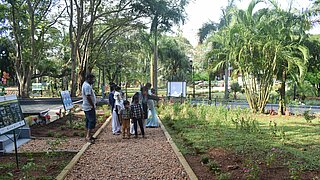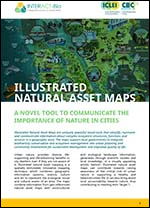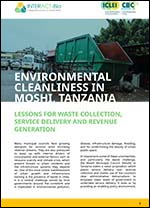When nature leads, cities succeed

The project INTERACT-Bio improves the utilization and management of nature within fast-growing cities. It aims to provide urban communities with nature-based solutions and associated benefits.
INTERACT-Bio is a project implemented by ICLEI which aims at improving the utilization and management of nature within fast-growing cities and the regions surrounding them in Brazil, China, Colombia, India, South Africa and Tanzania. To do so, the project works at strengthening the integration of biodiversity management at all levels of governance and facilitate cooperation between national and sub-national authorities.
Creating an enabling political environment in the model city regions
INTERACT-Bio has first developed baselines on biodiversity management as well as ecosystem assessment and valuation in its model city-regions through a scoping study and natural asset maps. Furthermore, in cooperation with the city and local stakeholders, the project conceived intervention concepts (e.g. ecosystems connectivity in Campinas, Brazil), and designed Local biodiversity strategic action plans (LBSAPs). These were adopted by the model city-regions. The goal is to localize the implementation of the National Biodiversity Strategic Action Plans for the project countries. In this scoping and strategizing process, INTERACT-Bio has also engaged closely with local and national stakeholders through participatory processes to ensure their buy-in on the project activities and raise their awareness on the value of nature, ecosystem services and nature-based solutions. This was done mostly through the organization of several multi-disciplinary multi-stakeholder dialogues as well as multilevel forums aiming at establishing a dialogue between the different layers of governance. These dialogues ensured that policies adopted by different public authorities are aligned and form a coherent and intelligible framework for biodiversity.
Implementing nine pilot projects
This first part of the project work focused on creating an enabling political environment in the model city-regions which allowed to move to the implementation phase of the project. During this phase, INTERACT-Bio has developed and implemented nine pilot projects in Brazil, India and Tanzania to demonstrate the multiple benefits of implementing local biodiversity actions and their contributions to supporting sustainable urban development. Those demonstration projects include environmental based adaptation measures such as rain gardens in Belo Horizonte, Brazil, educational measures such as the creation of a nature interpretation center in Kochi, India, or the creation of green spaces in drought-prone Dodoma, Tanzania. The project also addressed the matter of financing urban biodiversity projects through the development of two guides on how to make the case for investing in urban nature and on financing local biodiversity projects. Those guides are set in practice through the development of investments cases in Brazil, India and Tanzania. In China, Colombia and South Africa INTERACT-Bio will map, assess and trial financing instruments and mechanisms that support local biodiversity actions.
Creating impact beyond model city regions
Finally, INTERACT-Bio is also working on having an impact beyond the geographical boundaries of the model city regions and the timeframe of the project by creating a community of practices to share the lessons learned of INTERACT-Bio and build on them. To do so, the Cities with Nature initiative was launched as reporting platform for local governments commitments to nature endorsed by the Secretariat of the CBD and by CBD CoP Decision 15/12. The platform also became a depository for best practices regrouping more than 300 local governments. In parallel, INTERACT-Bio has also been active fostering peer exchanges between cities through South-South and North-South peer learning workshops as well as through bringing the model city regions at the CBD CoPs 14 &15 to share the lessons learned from INTERACT-Bio.
The link has been copied to the clipboard
Contact
IKI Office
Zukunft – Umwelt – Gesellschaft (ZUG) gGmbH
Stresemannstraße 69-71
10963 Berlin
IKI Brown Bag Lunch
On November 14, 2023, an IKI Brown Bag Lunch on Urban Biodiversity took place.
Related Publications
-
 09/ 2023 | Tool/Open source product
09/ 2023 | Tool/Open source productInteractBio Biodiversity Financing Toolkit
English (external link)
-
 08/ 2021 | Educational material
08/ 2021 | Educational materialIllustrated Natural Asset Maps: A novel tool to communicate the importance of nature in cities
English (external link)
-
 08/ 2021 | Educational material
08/ 2021 | Educational materialEnvironmental Cleanliness in Moshi: Lessons for waste collection, service delivery and revenue generation
English (external link)










